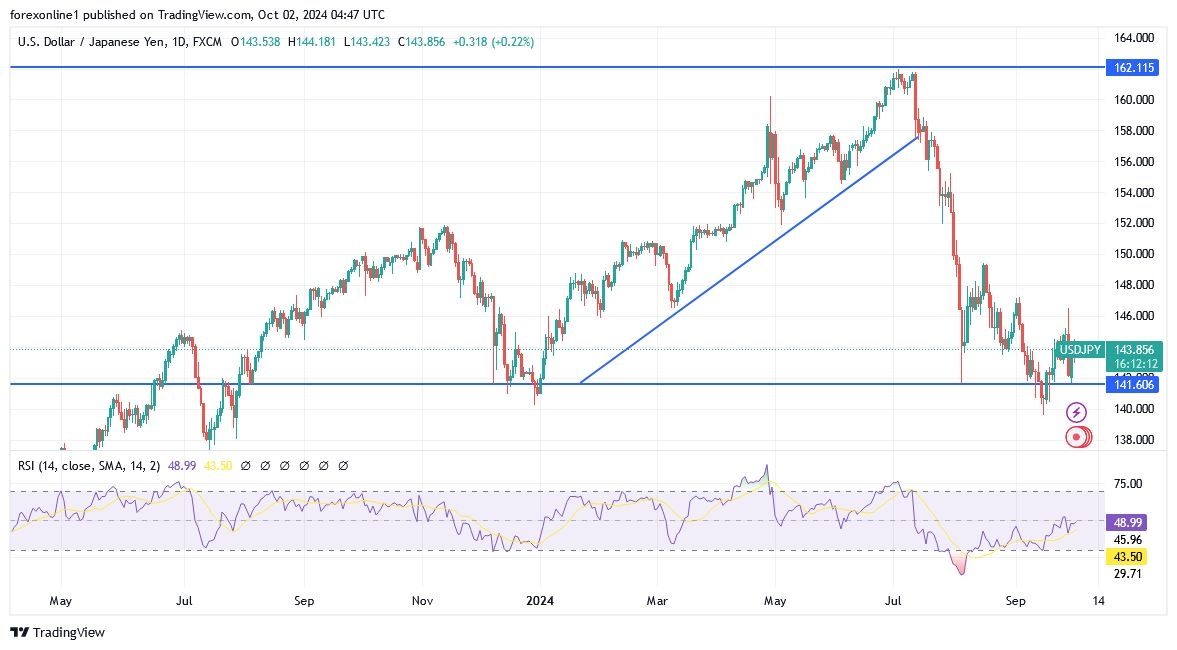- The Japanese yen fell below 144 against the US dollar, falling for the second consecutive session, after US Federal Reserve Chairman Jerome Powell dismissed bets on further large cuts to US interest rates.
- Powell indicated that the Fed would opt for modest 25 basis point cuts in the remaining meetings this year, clarifying that they are "not on any predetermined path."

Also, The Japanese yen came under pressure after former Defence Minister Shigeru Ishiba, who won the leadership of Japan’s ruling party last Friday, said that policy should remain accommodative due to current economic conditions. On the economic data front, Japan’s unemployment rate fell to 2.5% in August from 2.7% in July, which was better than market expectations of 2.6%. Also, the Bank of Japan’s quarterly Tankan survey showed that sentiment among major manufacturers remained at a two-year high in the third quarter.
According to stock trading company platforms, Japanese stocks rose as the yen weakened. The Nikkei 225 index jumped 1.93% to close at 38,652 points, while the broader TOPIX index rose 1.69% to close at 2691 points on Tuesday, recouping some of the losses that followed heavy selling in the previous session, as the weak yen raised expectations for export-oriented Japanese industries. On Monday, the Nikkei 225 fell by about 5% as the yen strengthened on Friday after monetary policy hawk Shigeru Ishiba won the leadership contest to become the country's next prime minister. Likewise, Japanese stocks tracked gains made on Wall Street overnight as Federal Reserve Chairman Powell reaffirmed his plans for further cuts to US interest rates.
Top Forex Brokers
From the United States. U.S. stocks fell sharply on Tuesday after news of missile launches from Iran into Israel. The Dow Jones Industrial Average fell 238 points, or 0.4%, while the S&P 500 fell 1.1% and the NASDAQ Composite fell 1.9%. West Texas Intermediate crude oil rose after Iran fired missiles into Israel. The CBOE Volatility Index (VIX), often called Wall Street’s fear gauge, jumped above 20, reflecting growing concerns among traders.
The attack on Israel comes at a time when the global economy is already grappling with rising inflation and fears of an economic slowdown. Iran’s decision to fire the missiles followed Israel’s military incursion into southern Lebanon, which targeted Hezbollah, an Iranian-backed group. According to the Israel Defense Forces (IDF), the missiles were fired from Iran, prompting warnings for people to seek shelter immediately.
Furthermore, financial markets were quick to react, with the Dow down sharply by mid-morning. The S&P 500 fell 1.4%, and the Nasdaq followed suit, losing more than 2% as investors rushed to adjust their portfolios in response to geopolitical developments.
USD/JPY Technical analysis and Expectations Today:
Based on the daily chart, the overall trend for the USD/JPY pair remains bearish. As I mentioned before, approaching the psychological level of 140.00 will remain key to confirming the strength of the bears’ control over the trend. On the other hand. In the same time frame, bulls will not regain control of the general trend without moving towards the resistance levels of 147.95 and the psychological resistance of 150.00 respectively. Decisively, the USD/JPY price will remain stable around its current range until the reaction to the announcement of the US jobs numbers and the statements of the US Federal Reserve officials.
Ready to trade our Forex daily forecast? We’ve shortlisted the best brokers in Japan for you.
